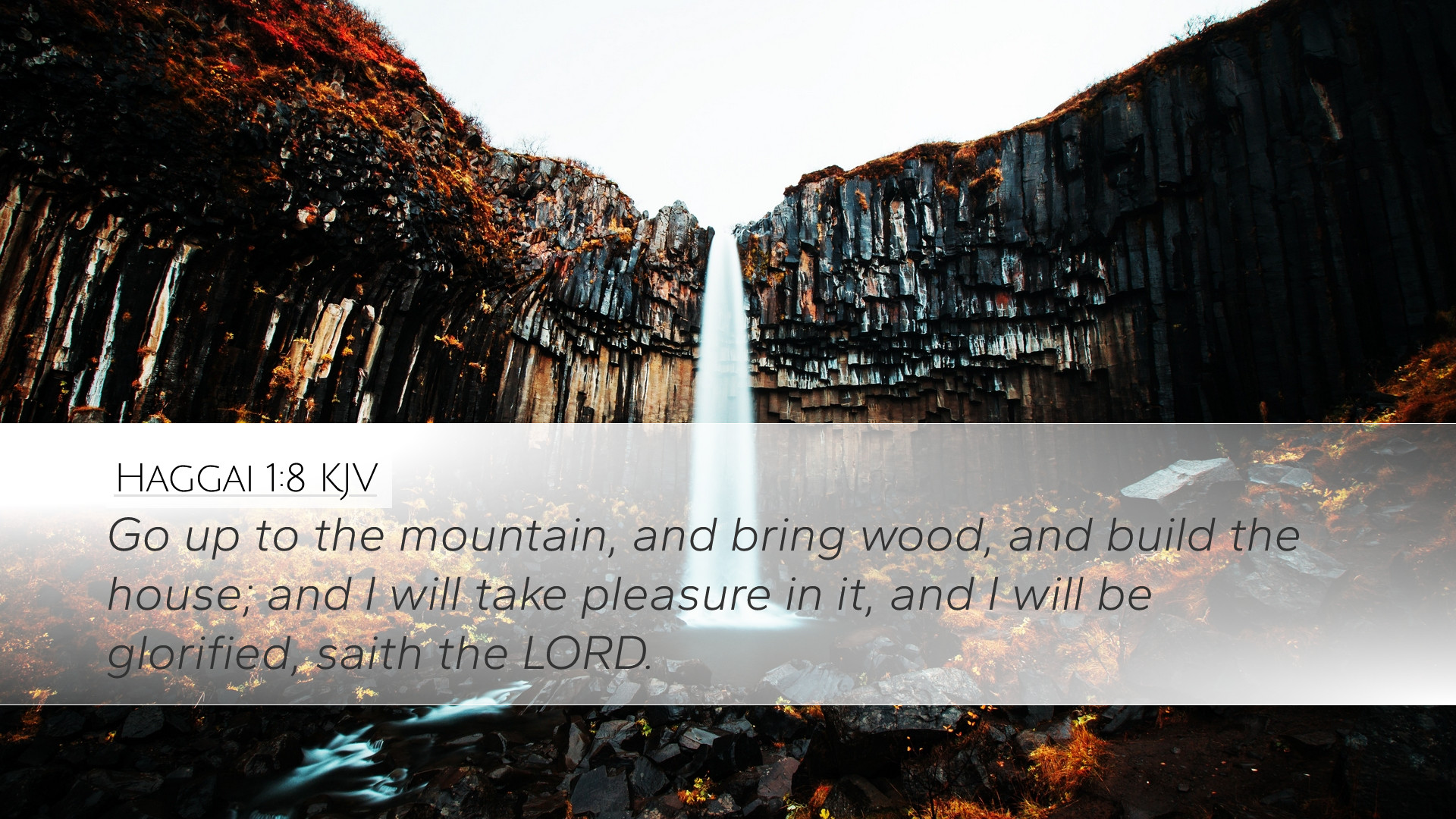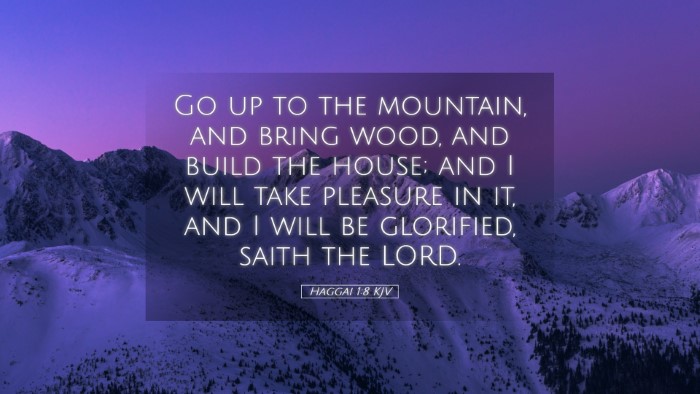Old Testament
Genesis Exodus Leviticus Numbers Deuteronomy Joshua Judges Ruth 1 Samuel 2 Samuel 1 Kings 2 Kings 1 Chronicles 2 Chronicles Ezra Nehemiah Esther Job Psalms Proverbs Ecclesiastes Song of Solomon Isaiah Jeremiah Lamentations Ezekiel Daniel Hosea Joel Amos Obadiah Jonah Micah Nahum Habakkuk Zephaniah Haggai Zechariah MalachiHaggai 1:8
Haggai 1:8 KJV
Go up to the mountain, and bring wood, and build the house; and I will take pleasure in it, and I will be glorified, saith the LORD.
Haggai 1:8 Bible Commentary
Commentary on Haggai 1:8
"Go up to the mountain, and bring wood, and build the house; and I will take pleasure in it, and I will be glorified, saith the LORD." (Haggai 1:8 KJV)
Introduction
The book of Haggai addresses the people of Israel after their return from Babylonian exile. It emphasizes the importance of prioritizing the rebuilding of the temple in Jerusalem, which reflects God’s glory and presence among His people. Haggai 1:8 captures God's command to the people and results in an urgent call to action. This verse is pivotal for understanding not only the historical context but also the theological implications of restoring worship and covenant relationship with God.
Contextual Background
The people of Israel, after returning to their homeland, had faced numerous challenges. They were discouraged and had neglected the house of God, focusing instead on their own dwellings. The messages of Haggai are propelled by the need to refocus the community on God’s priorities. Haggai serves as a prophet to reignite the zeal for the house of the Lord. This prophetic call is not merely about physical construction but signifies a deeper spiritual renewal.
Exegesis of Haggai 1:8
This verse can be broken down into several key components:
- Divine Command: "Go up to the mountain, and bring wood..." This reflects God's initiative, urging His people to action. The mountain symbolizes a place of elevation, suggesting the effort required to retrieve materials for building.
- Participation in God's Work: The use of “bring wood” emphasizes the need for material resources, highlighting the community's role in the physical aspect of worship. It also implies personal sacrifice and effort in contributing to the restoration of the temple.
- The Purpose of Construction: "and build the house..." The call to rebuild signifies the reinstatement of God's presence among His people. The temple is central to worship and community identity, reflecting the covenant relationship with God.
- Divine Pleasure and Glory: "and I will take pleasure in it, and I will be glorified..." This statement assures the people that their efforts will not go unnoticed. It underscores the theological principle that God desires to dwell among His people and takes delight in their worship.
Theological Insights
Haggai 1:8 teaches crucial theological lessons relevant to contemporary faith communities:
- The Necessity of Prioritizing God: The neglect of the temple symbolizes a neglect of God in our lives. Therefore, the directive to build emphasizes prioritizing God's house over personal comfort, urging believers to evaluate their commitments and spiritual priorities.
- God’s Desire for Community: God's initiative in calling His people to rebuild demonstrates His investment in community worship and His desire to reside among them. The physical act of construction becomes a spiritual exercise of communal identity and purpose.
- The Relationship between Work and Worship: The act of gathering materials and rebuilding the temple connects practical labor with spiritual worship. This connection highlights that our daily tasks can be acts of worship when undertaken for God’s glory.
- The Assurance of Divine Blessing: God promises that He will take pleasure in their labor, affirming that when His people align their efforts with His will, it leads to divine satisfaction and glory.
Application for Today
As we reflect on Haggai 1:8, several applications emerge for modern believers:
- Engagement in Church Life: This passage calls churches today to engage actively in the work of building and nurturing their communities. It emphasizes the importance of a communal effort in worship and ministry.
- Reflection on Personal Priorities: Believers are encouraged to examine what they prioritize in their lives. Haggai prompts a re-evaluation of whether personal pursuits overshadow commitments to God’s kingdom.
- Understanding of Worship’s Holistic Nature: Worship is not confined to Sunday services; it requires dedication and participation in God’s work beyond the church walls. The physical, emotional, and spiritual dimensions of our lives are all part of our worship to God.
- Hope in God’s Promises: Just as God promised to take pleasure in the rebuilding of the temple, believers are reassured that God delights in the work done for His glory today. This builds hope and encourages steadfastness in the face of challenges.
Concluding Thoughts
Haggai 1:8 stands as a powerful reminder of God’s call to His people to engage in the work of restoration, both physically and spiritually. Through the ancient context, we glean timeless principles about God's desires for worship, community, and personal engagement. As we respond to Haggai’s message, may we collectively seek to rebuild and refocus our lives upon God's purposes, ensuring that He is glorified in all that we do.


